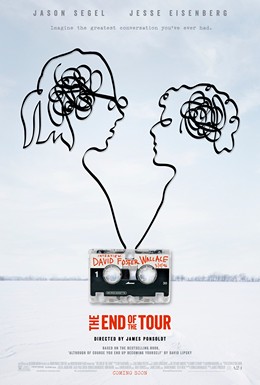Sometimes, you sit down in the theater and a movie you see just works for you. Whoever you are at whatever moment in time, that can make all the difference. Maybe 10, 15 years from now, it won't strike that same chord, but in that specific period of your life? When the right movie comes? It can be a very satisfying experience. That was what "The End of the Tour" was for me. I'm a writer, I'm 27. The main characters in this film are in their early 30s and what they're going through, what they talk about, are things that I can very much identify and empathize with.
So I loved "End of the Tour." I think it's a good movie any way you slice it, but I just want to be honest about where I'm coming from with my evaluation. Definitely see the film as I think it's incredibly perceptive and wonderfully, almost delicately crafted. There have been quite a few movies set in the '90s before, but this was the first time I've ever actually felt transported into that time period. Most important though are these characters, who simply feel lived-in and naturalistic in this world.
Jesse Eisenberg plays David Lipsky and Jason Segel plays David Foster Wallace. The story takes place in 1996 when Lipsky was 30 and DFW was 34. Lipsky just had a book of his published, but the talk of the literature world is this David Foster Wallace fellow, who's in the midst of a book tour for his 1,097-page novel Infinite Jest. It's not just that it's good, it's intimidatingly good. As a result of all the hooplah, Lipsky becomes fascinated and wants to do a piece on the writer for Rolling Stone.
When he visits Wallace in his snowy, modest Midwest home, he's struck by how normal and guarded DFW is. As a matter of fact, David Foster Wallace is not all that thrilled about having this journalist following him around, asking questions. Wallace may be a brilliant writer and Lipsky may be in awe of his talents, but DFW wants none of that. To paraphrase the movie (and Wallace), the more people think you're great, the more you end up feeling like a fraud. Wallace wants, more than anything else, to just live a normal life. He "cherishes his regular guy-ness," which he even says at one point.
Lipsky doesn't know what to make of all this. On one hand, Wallace is generally approachable. But because Lipsky's a journalist, there's an unwillingness inside Wallace to want to open up to him. You get the feeling that Lipsky just wants to be his friend, wants to feel connected to him. Maybe he wants some of that "brilliance" to rub off on him. But Lipsky has issues of his own and when DFW calls him out during one particular scene, an embarrassed Lipsky lashes out against him, taking issue with Wallace and his entire worldview.
Their genial conversations are interesting and their differences are even more fascinating. I was hooked by this movie from beginning to end, and like Lipsky, once I was in DFW's world, I didn't want to leave. And yet, there's a shame in feeling such a way because that invasion of space and privacy is something that goes against everything Wallace stands for. He was a fascinating guy, and what the movie does so well is how it captures him just in that specific moment in time back in 1996. He's got his own worries, yet despite the movie being bookended with news of his tragic suicide in 2008, the middle chunk of the film never feels like some bad omen. There's just enough careful attention paid to these characters; they feel multi-dimensional. Both his life and death are treated with equal amounts of respect.
I guess what gives me a little bit of peace, and director James Ponsoldt says just as much in this AV Club interview, is that this is really David Lipsky's story. And this movie is David Lipsky's POV of who DFW really is. Is that enough to justify the making of this movie? Maybe not. But what can I say? I really, thoroughly enjoyed this film and felt connected to it on several levels. Those types of inherent contradictions illuminates the themes of the film. The movie shouldn't exist, but it does. It's a great film, but it can't help but view DFW as a larger-than-life person. Yes, those contradictions exist and you can't exit the movie with a clean conscience... and that just makes me enjoy it even more.
Grade: A

No comments:
Post a Comment